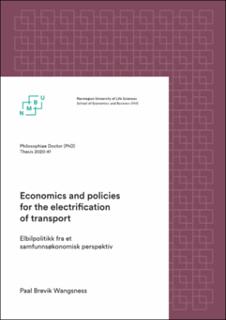| dc.contributor.advisor | Rosendahl, Knut Einar | |
| dc.contributor.advisor | Rødseth, Kenneth Løvold | |
| dc.contributor.author | Wangsness, Paal Brevik | |
| dc.coverage.spatial | Norway | en_US |
| dc.date.accessioned | 2023-02-21T11:04:28Z | |
| dc.date.available | 2023-02-21T11:04:28Z | |
| dc.date.issued | 2020 | |
| dc.identifier.isbn | 978-82-575-1705-2 | |
| dc.identifier.issn | 1894-6402 | |
| dc.identifier.uri | https://hdl.handle.net/11250/3052688 | |
| dc.description.abstract | This thesis focuses on the economics and polices for the electrification of transport. Over the last few years we have observed a rapid rise in the number of battery electric vehicles (BEVs) in Norway. This growth is the combined result of rapid technological change and a targeted national climate policy. The rising share of BEVs relative to the share of
conventional vehicles could lead to socio-economic benefits such as reduced greenhouse gas emissions and local pollution, but it could also pose new challenges such as pressure on the capacity of the electricity distribution network. In addition, BEVs have similar negative externalities as fossil-fueled vehicles with regards to congestion, road wear and accidents. BEVs can mitigate some market failures and exacerbate others, creating a messy optimization problem for the social planner. This illustrates the need for new knowledge on mechanisms and welfare enhancing policies in the transport and electricity markets as they become more integrated. This thesis seeks to contribute to the body of knowledge on the subject, in the following introductory chapter and four independent chapters. The latter chapters are written as scientific papers that are either published or in the process of getting published in peer-reviewed journals. | en_US |
| dc.description.abstract | Denne avhandlingen tar for seg elbilpolitikk i et samfunnsøkonomisk perspektiv. De siste årene har vi opplevd en rask økning i antall elbiler i Norge. Denne veksten er et resultat av både rask teknologisk utvikling og en målrettet nasjonal klimapolitikk. Den økende andelen av elbiler i forhold til andelen konvensjonelle biler kan føre til samfunnsøkonomiske fordeler som reduserte klimagassutslipp og lokal forurensning, men det kan også gi nye
utfordringer som press på kapasiteten til strømdistribusjonsnettet. I tillegg har elbiler tilsvarende eksterne kostnader som konvensjonelle biler med tanke på kø, veislitasje og ulykker. Elbiler kan dempe noen markedssvikt og forverre andre, og skape et rotete optimaliseringsproblem for samfunnsplanleggeren. Dette understreker behovet for ny kunnskap om den gjensidige påvirkningen mellom transport- og elektrisitetsmarkedet, og hva som kan være samfunnsmessig effektiv politikk. Denne avhandlingen bidrar til kunnskapen om emnet, i det følgende kappen og fire uavhengige kapitler. De siste kapitlene er skrevet som vitenskapelige artikler som enten er publisert eller i ferd med å bli publisert i fagfellevurderte tidsskrifter. | en_US |
| dc.language.iso | eng | en_US |
| dc.publisher | Norwegian University of Life Sciences, Ås | en_US |
| dc.relation.ispartofseries | PhD thesis;2020:41 | |
| dc.rights | Attribution-NonCommercial-NoDerivatives 4.0 Internasjonal | * |
| dc.rights.uri | http://creativecommons.org/licenses/by-nc-nd/4.0/deed.no | * |
| dc.title | Economics and policies for the electrification of transport | en_US |
| dc.title.alternative | Elbilpolitikk fra et samfunnsøkonomisk perspektiv | en_US |
| dc.type | Doctoral thesis | en_US |

